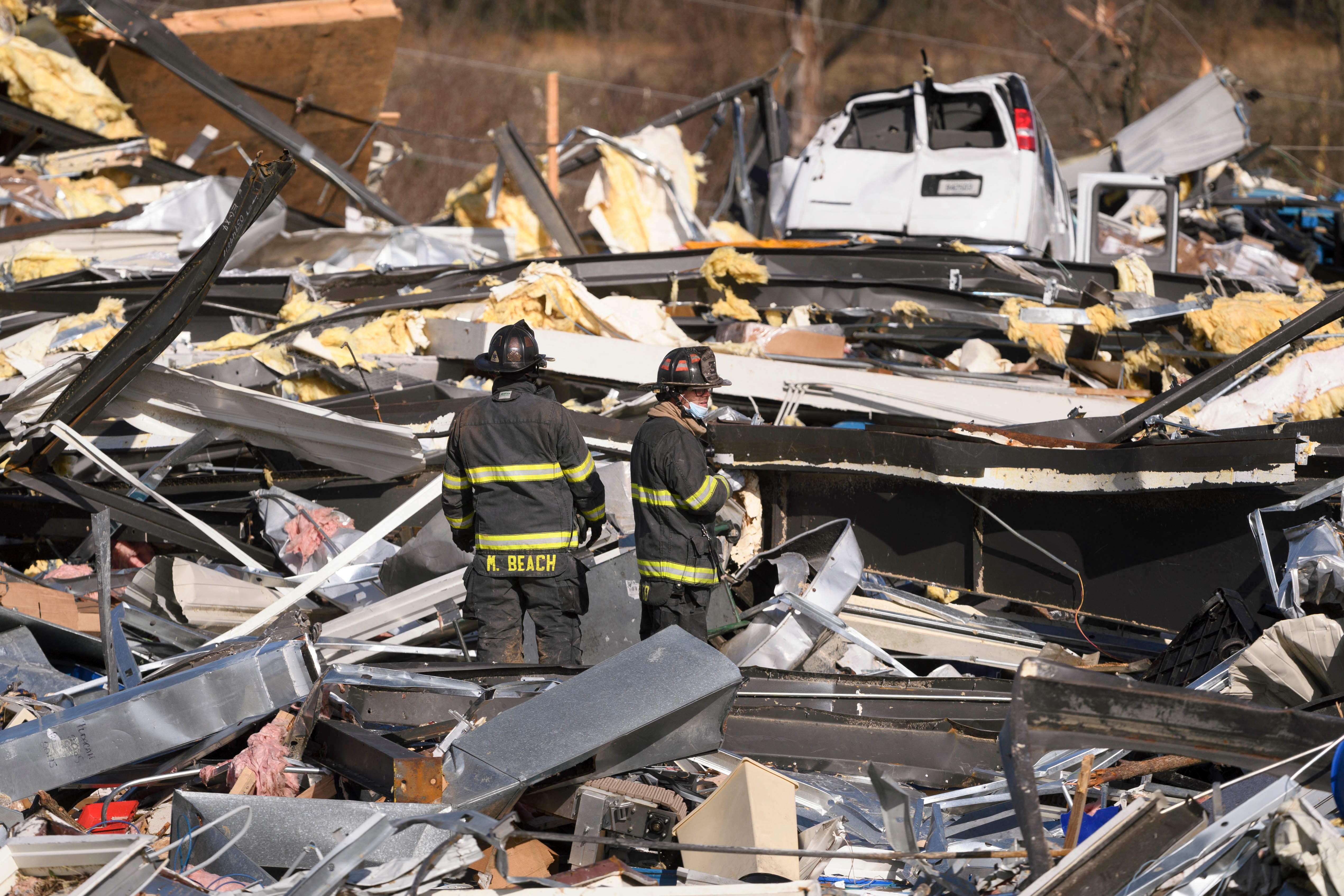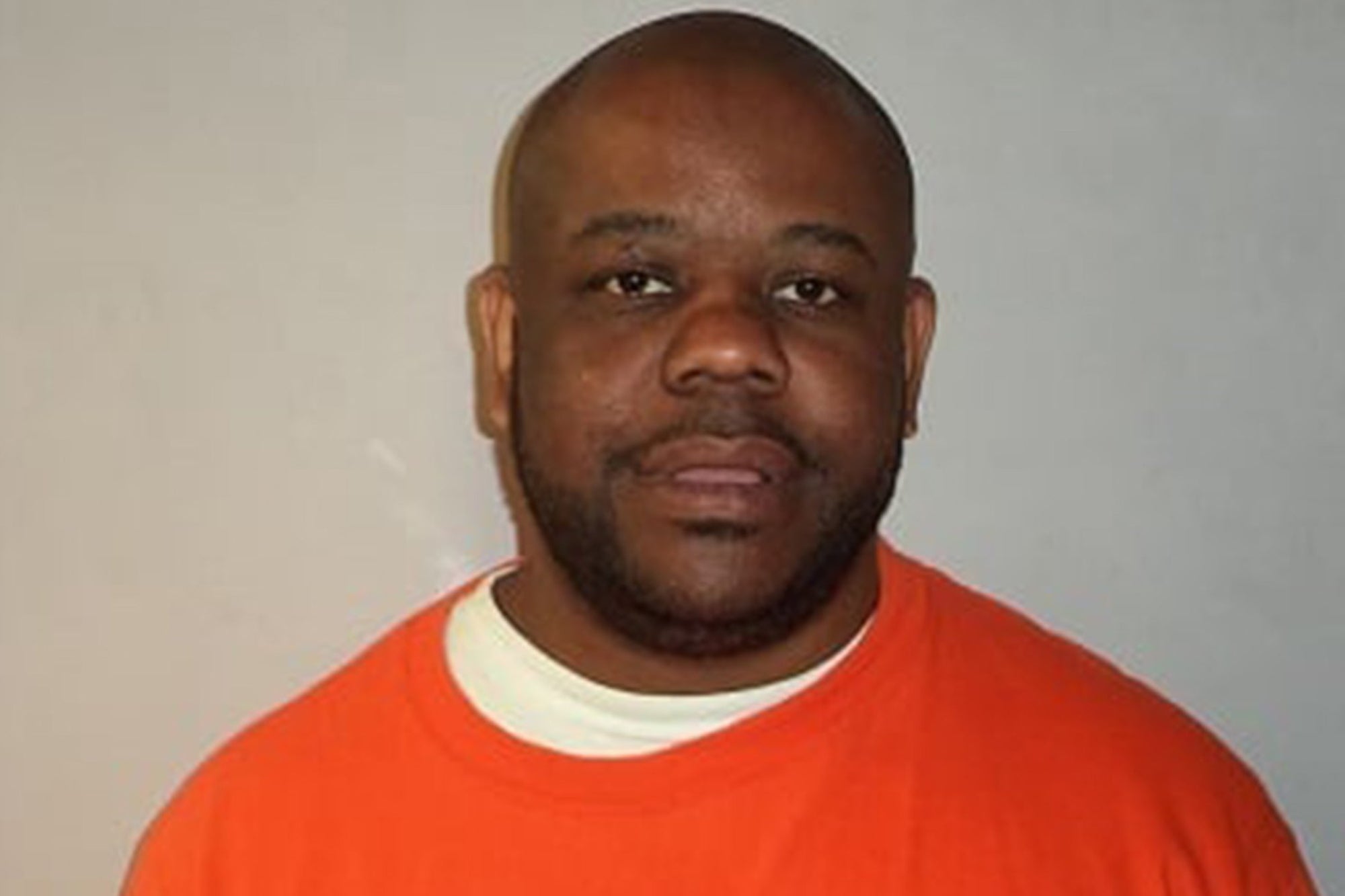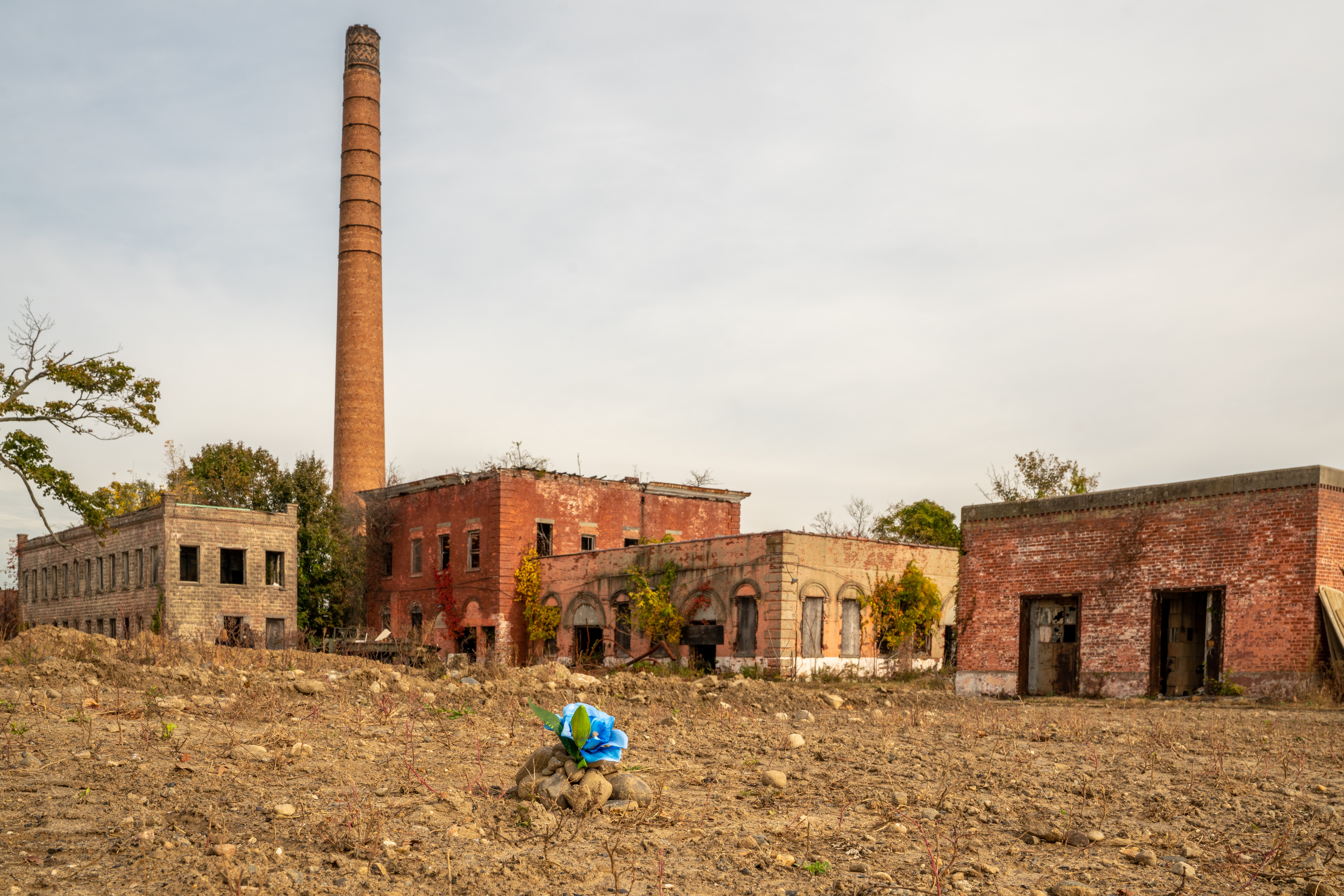An ‘escaped inmate’, injuries, death and no idea who foots the bill: Inside the Kentucky factory flattened by a tornado
Francisco Starks thought a prison work-release programme would give him a second chance. Then a historic tornado struck the Mayfield, Kentucky candle factory where he works, putting him in legal and physical jeopardy, Josh Marcus writes


Francisco Starks, a 44-year-old incarcerated person in Kentucky, was working inside a candle factory in the city of Mayfield when an historic December tornado hit, burying him and over 100 of his coworkers. At least eight people died in the collapse.
Starks was trapped under the rubble, but can’t remember how long, just the sounds of one of his colleagues losing consciousness and dying next to him.
Then, authorities accused Starks of trying to escape custody at the hospital, where he was being treated for injuries to his neck, back, and legs.

“The next day, it’s all over the news and the internet that he’s escaped,” his lawyer, Madison Leach, told The Independent. “He called me and he’s like, ‘Maddie I didn’t try to escape. They took me to the hospital and then I didn’t know where to go. I’m on crutches and leaving the hospital in pain. There’s nobody to pick me up. I don’t have a phone. I didn’t know what to do.”
Starks, 44, sought shelter with his daughter, who lives in the area, before returning to jail.
Now, he’s facing potential criminal charges as well as the prospect of costly medical bills, due to his place in the shadowy world of prison work programmes. He’s one of the lucky ones.
More than half-a-million inmates across the US work while behind bars for sub-minimum wages, performing the services essential to run a prison like cooking and cleaning. Roughly 63,000 of those workers make a huge variety of goods that are then sold to both government agencies and major companies. The industrial output of prisons is estimated to run more than a billion dollars each year. And in this Wild West world of practically non-existent worker protections, most don’t even have the meager guarantees Starks did.
Unlike many prison labourers, who often make less than a dollar an hour, Starks earned a wage comparable to someone in the free world. Officials who run the work-release programme in Graves County, Kentucky, didn’t respond to requests for comment from The Independent, and don’t publicly disclose inmate wages. Starks was making $8 an hour when the tornado hit, according to his lawyer, more than Kentucky’s minimum wage.

The county deducted at least $15 a day of those wages, according to Ms Leach, but still, a nearly regular wage, and the prospect of a job after getting out, are rare commodities for people behind bars.
Unlike many prison labourers, Starks enjoyed his job, too, and had supervisors who were kind to him, according to his family.
“He said he loved it there,” his daughter, Brooklyn Starks, told The Independent. “He loved the people there.”
The tornado struck during his first week on the job. He was part of a cohort of seven state inmates in a work-release programme in partnership with the Mayfield Consumer Products factory, a major employer in the town of 10,000, which makes candles for companies like Costco and Victoria’s Secret. Robert Daniel, the deputy jailer who supervised him, died trying to get the inmates to safety in the factory.
“The last thing he did was making sure [the inmates] were taken care of, even at his own peril,” county jailer George Workman told The Washington Post. “It was obvious during the interview process Robert was someone concerned about helping others and doing the right thing for his community.”
But despite these attentions, all was not well at the factory, according to workers there.
Workers were called onto the factory line even as it was clear a historic storm was approaching. The plant was “going 24/7” to meet holiday demand, according to congressman James Comer, who represents the area. Workers were ushered in and out of emergency shelter areas throughout the evening, until the tornado hit. Not everyone was able to make it back to safety in time – or get out of harm’s way before tragedy struck.
At least five workers at the factory said they were threatened with firing if they left early, which the company denies. The state is now investigating what happened at the factory.
Bob Ferguson, a company spokesperson, told NBC the investigation is "entirely appropriate”, and that a state official was given a tour of the factory, while denying wrongdoing.
“We’ve had a policy in place since Covid began," he said. "Employees can leave any time they want to leave, and they can come back the next day.”
The Independent has reached out to Mayfield Consumer Products for comment.
Stephanie Fisk, Brooklyn Starks’s mother, also works for Mayfield, and said the factory where Francisco Starks was working was old and “not stable” to begin with, even before the tornado, which leveled large parts of the town.
“If they come in here and inspect this place, everybody’s going to be in trouble,” she told The Independent. “They’ve got wires, you’re tripping over stuff.”
Records reviewed by the Kentucky Center for Investigative Reporting indicate that the Mayfield facility had an above-average rate of injuries on the factory floor, and was fined $16,350 by the Occupational Safety and Health Administration for violations found during a 2019 inspection. (The company contested the violations and said it complies with all federal standards.)
Starks, a state inmate, housed at a county facility, working for a private company, is now unsure of who will foot the bill for his extensive injuries. By law, incarcerated people don’t practically have any workplace protections, and aren’t allowed union rights, even though they often do the exact same kind of work as free people who do have these guarantees. If Starks has to put up the money himself, he won’t be able to pay, leaving him in debt and in jail, even though he had a job, according to his family.
“He’s out of income, but he’s also incarcerated. To put the inmates in that kind of jeopardy in the middle of a storm, and then they have no recourse. They can’t sue for negligence. They’re not making that much money,” Ms Leach, his attorney, said. “There’s a lot of money going around with these companies, yet now that he’s hurt, I don’t know who’s going to pick up the tab.”
The Kentucky Department of Corrections said to ask the local jail about Starks’ medical treatment, and the Graves County jail and Mayfield Consumer Products have not responded to requests for comment from The Independent about the work-release programme.
Subpar working conditions and little legal recourse are both common factors of incarcerated labour, according to experts.
Beginning in 1979, under an initiative called the Prison Industry Enhancement Certification Program, the federal government has certified qualifying private companies to use inmate labour. Under these arrangements, companies in industries ranging from animal husbandry to call centers to electronics manufacturing, can pay below minimum wage without offering their jailed workers union or OSHA protections, while nonetheless receiving tax benefits for hiring marginalised people.
In some states, authorities take up to 80 per cent of those wages to be put towards fees, restitution, and per diem charges for their housing in prison. In other states that use prison labour, inmates aren’t paid at all.
“There is an interesting debate that’s going on among incarcerated people, their families, communities, activists, around the meaning of prison labour,” said Sharon Dolovich, a professor of law at the University of California Los Angeles and director of the Covid Behind Bars Data Project. “To put it crudely, on the one hand is the view that this is by nature exploitative and slave labor, and that people shouldn’t be forced to work just because they’re incarcerated…On the other hand, people in prison want jobs. People say it makes the time pass. It can be very meaningful.”
The arrangement, where inmates’ jailers are also their bosses, leads to a highly skewed power dynamic, according to Charity Ryerson, founder of the Corporate Accountability Lab, which researches labour and supply chain practices.
She spent six months in federal prison herself in the early 2000s, after being arrested at a peaceful protest in Georgia at the School of the Americas, a notorious, now shuttered US military facility accused of training numerous Latin American dictators and war criminals.
Inside the federal prison in Pekin, Illinois, female inmates, under the watch of armed, mostly male guards, manufactured cages to be used to detain migrants at the US border. Ms Ryerson was paid 12 cents an hour to drive a forklift that lifted scrap metal, and she said she began thinking of her time in how many hours it would take to afford tampons at the prison store, since the facility didn’t provide them to inmates.
“As a prison worker, your boss is a guard. Instead of having a regular boss-employee relations, your direct supervisor carries a gun and can impact every aspect of your life,” she said. “It just filters through everything. The amount of power this armed guard has over your life is nothing like a normal employer in a reasonable workplace with appropriate labour protections would have. That was set up from the beginning to have a lot of abuse of power, and I absolutely saw that myself.”
These dynamics have become even more acute during the coronavirus pandemic. Inmates are doing vital work, but are facing greater risks than the general population for doing so, all with less protections.

Incarcerated people have dug mass graves in New York, washed hospital laundry in Oregon, and manufactured hand sanitiser in at least 20 states. Prisons, often cramped and poorly ventilated, were also home to some of the worst Covid outbreaks in the country. A Stanford University study found that coronavirus spread faster in prisons than on cruise ships, and prison labourers, circulating through various parts of facilities each day to do their jobs, come into even more contact with people than the average prisoner.
It’s a situation that to suggests, according to Professor Dolovich, just how much prisons – and the broader economy – could be viewed as relying on the incarcerated to stay afloat and remain financially viable. They are essential workers in multiple senses of the word.
“When you think about just how many people are incarcerated in the US, then you start to say, ‘Well, maybe some of the dynamics of incarceration are that it creates a captive labour force that are necessary to keep private industry and even the public industry of the prison below cost,’ this is the kind of thing you might argue.”
Back in Mayfield, even the non-incarcerated aren’t sure about going back to work at the candle factory.
“We kept telling them, ‘Why did you have us coming into to work when you knew the weather was going to be bad,’” said Stephanie Fisk.
The company has said it’s going to pay her a $1,000 bonus from its tornado relief fund, but that still might not be enough to convince her to keep working there. She’s still making up her mind.
But all around the country, factories that rely on inmate labour will continue to hum along, despite the Covid crisis, the climate crisis, and everything else. For many, it’s a deal that’s too good to pass up.
